The fundraiser required running dozens of laps in the heat of the day, but the exertion was well worth the effort for St. Mark’s School students hoping to make life a little brighter and lighter for children at their partner school, St. Andre’s in Trianon, Haiti.
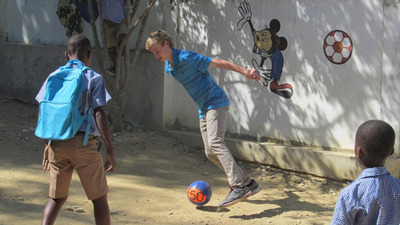 Eighth grader Christopher Johnshoy-Currie, 14, said he organized the June 2 run-a-thon at the Upland school track after a February visit to Haiti changed his young life.
Eighth grader Christopher Johnshoy-Currie, 14, said he organized the June 2 run-a-thon at the Upland school track after a February visit to Haiti changed his young life.
He marveled to see Haitians — facing the challenges of extreme poverty and scarce resources, and still recovering from the devastating 2010 earthquake — fill a church for a three-hour worship service.
“The people I saw in that church were happy and rejoicing in the Lord,” Chris recalled. “They were excited to learn about God. They were appreciating God for what they have.
“Some Americans are way more fortunate than any Haitian and they don’t praise God for what they have. Haiti was a life-changing example of what we should do because we are better off than most of them,” he said.
Something else stood out during the trip for the Upland student: “I saw they didn’t have electricity, and I thought, why not raise money to buy Luci lights, because they’re inexpensive and they need no electricity, just the sun, to work,” Currie told The Episcopal News recently.
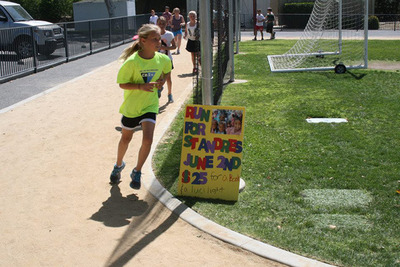 Aided by teachers and school staff, he organized the June 2 run-a-thon, which he hopes to make an annual event. All of St. Mark’s students participated, he said, raising about $5,000.
Aided by teachers and school staff, he organized the June 2 run-a-thon, which he hopes to make an annual event. All of St. Mark’s students participated, he said, raising about $5,000.
The lightweight solar-powered lights cost about $15 each; they incorporate the functions of a flashlight and diffused lantern, using a rechargeable lithium-ion battery. Each St. Andre’s student and staff member’s child will receive a light and a book, according to Chris.
“They don’t have electricity in their homes so they can’t really do anything after dark; this gives them an opportunity to either read or talk with their family at nighttime.”
In addition to St. Mark’s and St. Andre’s, there are at least ten other such Los Angeles-Haiti partnerships, says Canon Serena Beeks, executive director of the diocesan commission on schools.
For the past 15 years Beeks has served as a matchmaker for the partnerships, collaborating with the Rev. Roger Bowen, U.S. liaison for the National Association of Episcopal Schools (NAES) Partnership Program. They, in turn, work with the Rev. Kesner Ajax, Haiti’s partnership program coordinator, who calls Beeks’ and Bowen’s efforts “incomparable … in Haiti, we pray for them minute after minute.”
More than anything, Ajax said, U.S. partners “bring hope. It’s important for us in Haiti because we feel we are not alone. And our U.S. partners learn a lot from Haiti; when they get back, their life changes.”
‘Less mission trip, more pilgrimage’
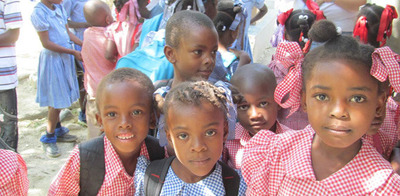 The Episcopal Diocese of Haiti oversees about 250 preschool through college-level schools with a total of about 200,000 students. Roughly one-third of the schools have U.S. partners, Ajax said.
The Episcopal Diocese of Haiti oversees about 250 preschool through college-level schools with a total of about 200,000 students. Roughly one-third of the schools have U.S. partners, Ajax said.
Partnerships run the gamut from helping to build new schools — especially since the earthquake — to offering meals, pupil exchanges, health care, agriculture, educational opportunities, prayers and presence.
Beeks said that about 60 schools, churches and institutions in the United States have Haitian partnerships. “Some have visited a lot of times. Some have sent money and never visited and then there’s everything in between.”
She encourages visits; then the experience becomes, she says, “less of a ‘mission trip’ and more a pilgrimage after witnessing the places we go and the people we visit in our own sister Episcopal Church who live with deep faith because they don’t have much else to live with. It’s inspiring and humbling.”
The partnerships can be flexible, creative, and mutually beneficial, she added. For example, All Saints by-the-Sea Church in Santa Barbara helped rebuild a school destroyed by the earthquake while St. Mark’s Church and School in Altadena provides hot meals for its partner school. Still another partnership, the nonprofit For A Reason (FAR), is financing a nursing education in Haiti for two young adults.
A strong partnership between Altadena and La Tournelle
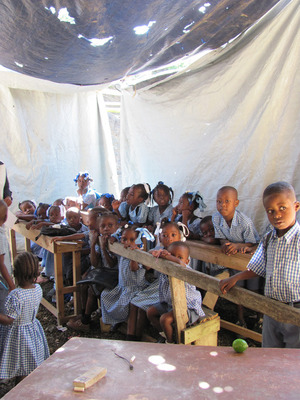 St. Mark’s Church and School are heading into their fourth year as a Haiti partner to provide a daily hot meal to 160 students and staff at St. Marguerite’s School in La Tournelle “and every year the connection becomes stronger,” according to head of school Doreen Oleson.
St. Mark’s Church and School are heading into their fourth year as a Haiti partner to provide a daily hot meal to 160 students and staff at St. Marguerite’s School in La Tournelle “and every year the connection becomes stronger,” according to head of school Doreen Oleson.
This year, they added another partner, St. Mark’s in Southborough, Massachusetts.
Since the partnership began in 2012, visits have been exchanged, numerous fundraisers held and St. Marguerite’s is a palpable presence through artwork, music and song at the Altadena church and school, according to the Rev. Betsy Hooper-Rosebrook, associate rector and school chaplain.
“We are able, by virtue of being Americans, to contribute in some more tangible financial ways,” she said. “But what each group that visits discovers is how much we gain by understanding the faith and joy and perseverance and trust of the Haitian people and their strong commitment to community, and the vibrancy of their culture, too.”
Benefits of the partnership are immeasurable for all involved, she said. For example, the lunch program benefits those fed, and “also the people who get the food supplies up to the school, the women who come and cook the lunch, the students [who] take home some of their lunch to share with their families. So it really benefits the whole community, not just the students. Doing this can truly make a difference in the health of a community; that’s kind of exciting for us.”
And St. Mark’s students learn “there are children in other parts of the world,” she said. “When you’re young, your world is generally pretty small because you’re small. It’s hard to think globally but they can think of another community and they can see photos of school children in uniforms or our Sunday school children can see pictures of children at St. Marguerite and imagine being in that place.”
Also there is “the realization somebody’s praying for them as well as they are praying for someone else. So the notion of being a community of faith has extended over a great distance. I’ve certainly had a lot of questions from students when we’ve had chapel talks or conversations. It’s an opportunity to talk about what brings someone joy and that the external circumstances … can certainly make your life easier in many ways, but you can find joy and beauty even with very little in the way of tangible wealth.”
It has also strengthened relationships within the community, she said, among church members and school families who might not otherwise meet.
Dedicating St. Cyprien’s School
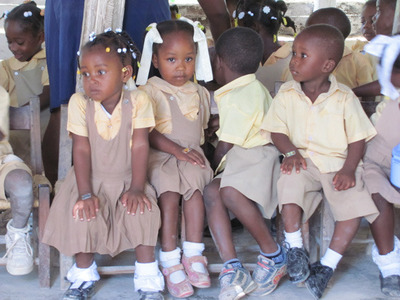 Call them unlikely friends with benefits — All Saints Church in Santa Barbara, with a $100,000 outreach budget, and earthquake-devastated St. Cyprien’s School in La Biche, a rural area roughly 100 miles southeast of Haiti’s capital city, Port-au-Prince.
Call them unlikely friends with benefits — All Saints Church in Santa Barbara, with a $100,000 outreach budget, and earthquake-devastated St. Cyprien’s School in La Biche, a rural area roughly 100 miles southeast of Haiti’s capital city, Port-au-Prince.
The Santa Barbara parish helped to rebuild St. Cyprien’s: a ten-room cinderblock and corrugated tin elementary school, to be dedicated July 12. It offers preschool through eighth grade education and a meal a day for about 250 students and their teachers.
“My participation in the Haiti school project has changed the person I am and how I see my place in the world,” Buchanan told The Episcopal News.
The shift in understanding from patron to partnership, from mission trip to pilgrimage, along with the progress she’s seen in the past four years “has been huge.” It’s understanding that Haitians know much better what they need on the other side.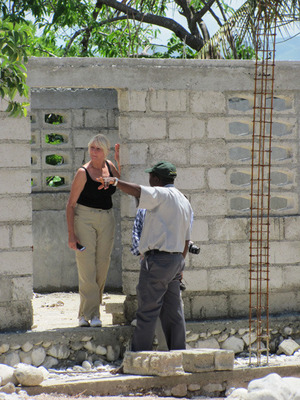
“There are roads going in, children being educated, having enough clothing, fed at least one dependable meal. It’s really about rethinking the way business is done.”
The next goal is for St. Cyprien’s to build a kitchen “so they can teach people how to cook,” she added.
Meanwhile, Walker said All Saints is still working out “what the relationship to the school is going to be going forward” but hopes eventually to link one of its Santa Barbara area school partners with St. Cyprien’s. “It’s something I’ve struggled with, what our relationship will look like with the Haiti school going forward. Will it be prayerful only or active involvement? I’m just not sure at this point that anyone knows.”
Realizing ‘A Reason’ to be there
St. Mark’s, Upland, teacher Denise Gideon created the non-profit For A Reason to help fund educational opportunities for young women like Ydelie, a nursing student from La Tournelle.
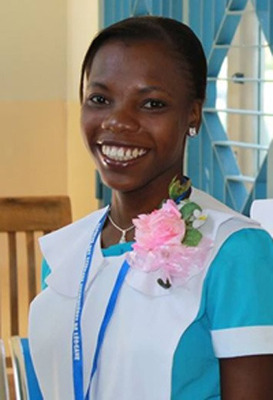 Once she has completed her education, Ydelie will return to develop a small clinic-triage-first aid station, the first and only medical care in the rural area.
Once she has completed her education, Ydelie will return to develop a small clinic-triage-first aid station, the first and only medical care in the rural area.
Reaching La Tournelle involves a three-hour hike from the nearest road, crossing a river and finally a very steep climb up a mountain, according to Gideon. “A small church and school are the only two public buildings, both under reconstruction following the devastating 2010 earthquake. Most residents are subsistence farmers living in humble homes without electricity or running water.”
Gideon recalled how she and Serena Beeks met Ydelie last summer, “We fell in love with her immediately and her earnest desire to become a nurse,” she recalled. Ydelie scored very well on the entrance exam and has continued to earn very high marks for her work, Gideo said. “Part of the nursing program requires that the graduates return and serve in their communities for one year before receiving their clear certification.”
According to Beeks, visiting is key. Lives are changed when churches and students visit “and see how open and receptive the Haitian people become almost immediately to people who are very different from themselves.”
